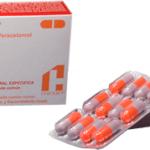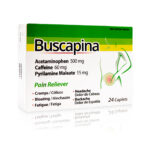Sedalmerck: Side Effects, Dosage, Uses, and Review

Sedalmerck is a Mexican combination pain medication that contains caffeine, acetaminophen and phenylephrine as active ingredients. This medication is used to treat headaches, fever, pain, and to treat nose stuffiness.
Caffeine is a stimulant, which means it increases activity in your brain and nervous system. Studies show that caffeine helps drugs like acetaminophen be 5-10 percent more effective at relieving pain. Caffeine helps reduce the way the brain perceives pain, while boosting the production of dopamine, which acts as a natural painkiller.
Acetaminophen relieves pain by elevating the pain threshold, that is, by requiring a greater amount of pain to develop before a person feels it. It reduces fever through its action on the heat-regulating center of the brain. While phenylephrine works by directly stimulating alpha-1 adrenergic receptors in the arteries causing vasoconstriction (narrowing of the blood vessels). This reduces nasal congestion by preventing fluid from draining from the blood vessels into the tissues lining the nasal passages.
What are some things I need to know or do while I take Sedalmerck?
• Tell all of your health care providers that you take Sedalmerck. This includes your doctors, nurses, pharmacists, and dentists.
• Do not take more than what your doctor told you to take. Taking more than you are told may raise your chance of very bad side effects.
• Do not take Sedalmerck for longer than you were told by your doctor.
• Avoid taking other products that have paracetamol (acetaminophen) in them. Check labels closely. Too much paracetamol (acetaminophen) may cause liver problems.
• This medicine has paracetamol (acetaminophen) in it. Liver problems have happened with paracetamol. Sometimes, this has led to liver transplant or death. Most of the time, problems happened in people taking more than 4,000 mg (milligrams) of paracetamol in a day. People were also often taking more than 1 drug that had paracetamol.
• Follow the directions exactly. Do not take more paracetamol (acetaminophen) in a day than directed. If you do not know how much paracetamol (acetaminophen) you can take in a day, ask your doctor or pharmacist. Some people may take up to 4,000 mg (milligrams) in a day if told to do so by the doctor. Some people (like people with liver problems and children) should take less paracetamol (acetaminophen). Call your doctor right away if you have taken too much paracetamol (acetaminophen) in a day even if you feel well.
• Talk with your doctor before you drink alcohol.
• Limit your use of caffeine (for example, tea, coffee, cola) and chocolate. Use with Sedalmerck may cause nervousness, shakiness, and a fast heartbeat.
• This medicine may affect certain lab tests. Be sure your doctor and lab workers know you use Sedalmerck.
• Tell your doctor if you are pregnant or plan on getting pregnant. You will need to talk about the benefits and risks of using Sedalmerck while you are pregnant.
• Tell your doctor if you are breast-feeding. You will need to talk about any risks to your baby.
How should I take Sedalmerck?
Use Sedalmerck as ordered by your doctor. Read all information given to you. Follow all instructions closely. Take with or without food. Take with food if it causes an upset stomach.
To reduce your risk of side effects, take this medication at the lowest effective dose for the shortest possible time. Do not increase your dose or take this drug more often than directed by your doctor or the package label. For ongoing conditions such as arthritis, continue taking this medication as directed by your doctor.
Read the Patient Information Leaflet if available from your pharmacist before you start taking Sedalmerck and each time you get a refill. If you have any questions, ask your doctor or pharmacist.
What do I do if I miss a dose?
If you take Sedalmerck on a regular basis, take a missed dose as soon as you think about it. If it is close to the time for your next dose, skip the missed dose and go back to your normal time. Do not take 2 doses at the same time or extra doses.
What are the side effects of Sedalmerck?
Sedalmerck can cause side effects which can include:
- Dizziness.
- Feeling nervous and excitable.
- Not able to sleep.
- Grouchy or touchy.
Even though it may be rare, some people may have very bad and sometimes deadly side effects when taking a drug. Tell your doctor or get medical help right away if you have any of the following signs or symptoms that may be related to a very bad side effect:
Signs of an allergic reaction, like rash; hives; itching; red, swollen, blistered, or peeling skin with or without fever; wheezing; tightness in the chest or throat; trouble breathing, swallowing, or talking; unusual hoarseness; or swelling of the mouth, face, lips, tongue, or throat.
Signs of liver problems like dark urine, feeling tired, not hungry, upset stomach or stomach pain, light-colored stools, throwing up, or yellow skin or eyes. Not able to pass urine or change in how much urine is passed.
A very bad skin reaction (Stevens-Johnson syndrome/toxic epidermal necrolysis) may happen. It can cause very bad health problems that may not go away, and sometimes death. Get medical help right away if you have signs like red, swollen, blistered, or peeling skin (with or without fever); red or irritated eyes; or sores in your mouth, throat, nose, or eyes.
Sedalmerck Safety Information
Sedalmerck contains caffeine, and studies have demonstrated that people who take in a minimum of 100 mg of caffeine per day (can acquire a physical dependence that would trigger withdrawal symptoms that include headaches, muscle pain and stiffness, lethargy, nausea, vomiting, depressed mood, and marked.
Sedalmerck also contains acetaminophen. Taking too much acetaminophen may cause serious (possibly fatal) liver disease. It is the leading cause of acute liver failure in the U.S., and the drug in some cases has led to fatalities. Acetaminophen, accounts for more than 100,000 calls to poison centers, roughly 60,000 emergency-room visits and hundreds of deaths each year in the U.S. In England, it is the leading cause of liver failure requiring transplants.





